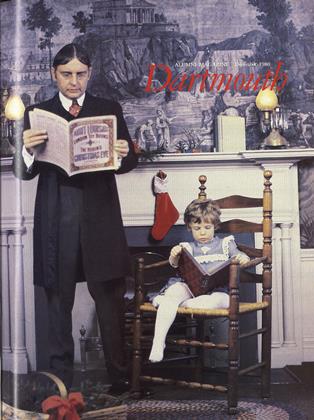This fall, while the Nominating Committee of the Alumni Council deliberated over its list of potential trustee candidates, the officers of the Association of Alumni produced a set of "guidelines" to codify the rules for nomination by petition and subsequent balloting in the event of a contest between a petition nominee and the Alumni Council nominee. In effect, the detailed rules and regulations specify standard procedures designed to prevent the kind of misunderstandings that accompanied the contest last spring between Dr. John F. Steel '54, a petition candidate, and Raymond J. Rasenberger '49, the Alumni Council's nominee.
Organized or funded campaigns on behalf of a particular candidate, the Alumni Association document says, are "contrary to the purposes and spirit of the nominating process, are not in the best interests of Dartmouth College, and should not occur." With that as a preamble, the guidelines set forth procedures for alumni trustee nominations and balloting as follows:
• A step-by-step schedule for the nominating process, beginning with a notice of a forthcoming trustee vacancy in the September issue of the ALUMNI MAGAZINE, announcement of the Alumni Council's nominee in the December issue, and a two-month period following that announcement for receipt of candidates by petition of 250 alumni. If a contest for the nomination ensues, ballots are to be sent to all alumni on March 20, with a deadline of May 1 for receipt of marked ballots in Hanover. The results of the balloting will be furnished to the Board of Trustees on May 10.
• Petition must be made by means of official forms furnished by the secretary of the College, and any person nominated by petition must certify his or her willingness to abide by the procedures established by the Alumni Association and consent to "unqualified acceptance of the responsibilities of the position of trustee as set forth in the trustees' charge." That charge, which each new trustee pledges to uphold, says that trustees shall represent no special-interest constituencies and that in the event of divided votes by the Board of Trustees each trustee is committed to accept the majority's decision.
• If more than one vacancy is to be filled, a candidate may be proposed for only one vacancy, which must be declared.
• If balloting for trustee nominee becomes necessary, the president of the Alumni Association shall appoint a ballot committee of three members from among the officers and Executive Committee of the Alumni Association. The committee will oversee compliance with the balloting procedures and rule on questions arising during the vote for trustee nominee.
• As part -of the material accompanying the ballots sent to the alumni, the ballot committee will itself prepare biographical statements for each candidate. In addition, each candidate will be allowed to submit a personal statement, not to exceed 400 words, responding to the, following question: "If you are nominated and elected as an alumni trustee of Dartmouth College, how will you fulfill the responsibilities of that position and carry out the trustees' charge?" This statement may not include the names of supporters or quote or refer to endorsements.
• After the voting deadline, the ballots will be opened and counted under the supervision of the president of the Alumni Association. An observer representing each candidate may be present but cannot participate in the tabulation of the votes.
• The candidate for a particular vacancy who receives the greatest number of votes among the candidates for that vacancy shall be declared the winner of the balloting for that position.
Copies of the new guidelines and petition forms may be obtained by writing the secretary of the Association of Alumni, Blunt Alumni Center, Hanover, New Hampshire 03755.
 View Full Issue
View Full Issue
More From This Issue
-
 Feature
FeatureAll the Way with J.B.A.
December 1980 By Frank Smallwood -
 Feature
FeatureOnce Upon a Time
December 1980 -
 Article
ArticleQuirkiness to Taste
December 1980 By Dana Cook Grossman -
 Class Notes
Class Notes1966
December 1980 By RICK MAC MILLAN -
 Article
ArticleMetaphysical Voyager
December 1980 By Robert H. Ross ’38 -
 Class Notes
Class Notes1940
December 1980 By RICHARD J. GOULDER
Article
-
 Article
ArticleJohn L. Sullivan '21 Is Trustee Nominee
MARCH 1963 -
 Article
ArticleSharing the fun
November 1976 -
 Article
ArticleGive a Rouse for
June 1987 -
 Article
ArticleNow When I Was in College About Twenty-Five Tears Ago
January 1933 By Hap Hinman '10 -
 Article
ArticleExercising the Mind
MARCH 1999 By Rich Barlow '81 -
 Article
ArticleFaculty
MARCH 1971 By WILLIAM R. MEYER


